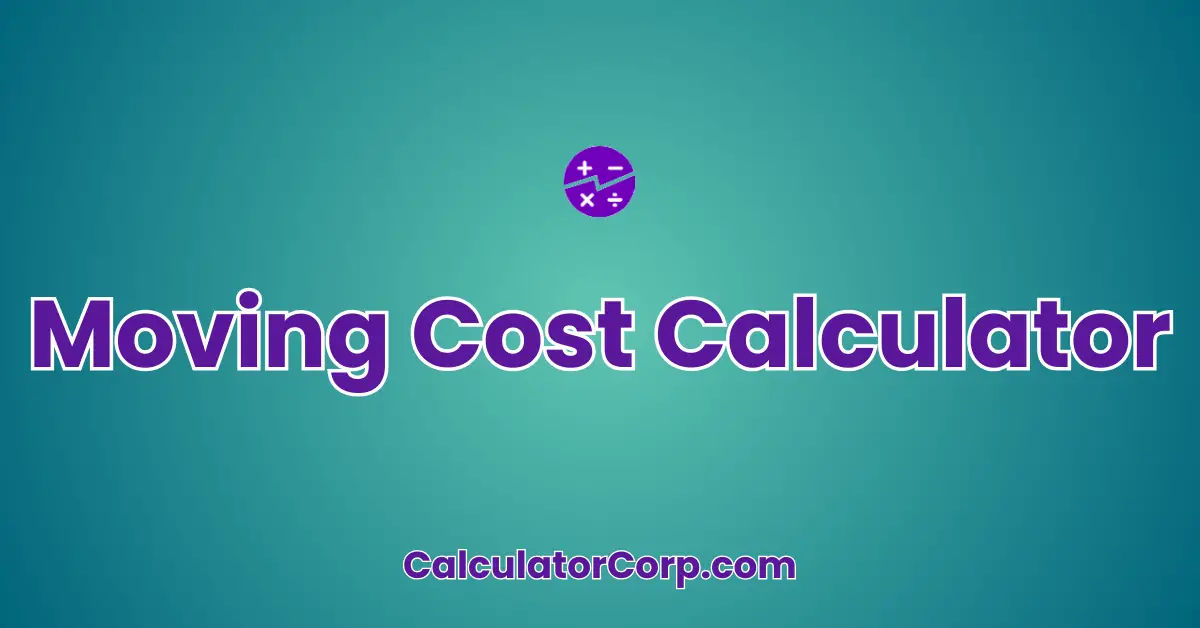A Moving Cost Calculator is a specialized tool designed to simplify the process of estimating the expenses associated with a move. Whether you’re relocating across town or across the country, understanding potential costs is crucial. This calculator serves diverse audiences, including individuals, families, and businesses, helping them plan and budget effectively.
Moving Cost Calculator
By inputting various parameters, users can get a detailed breakdown of expected costs, making it easier to make informed decisions and avoid surprises.
How to Use Moving Cost Calculator?
Using the Moving Cost Calculator is straightforward. Here’s a guide to help you navigate:
- Field Explanation: Enter the distance of your move in miles, the weight of your belongings in pounds, and the hourly rate of labor.
- Result Interpretation: The calculator provides a total estimated cost. For instance, a 200-mile move with 1,000 pounds of belongings at a $20 hourly rate might cost around $300.
- Tips: Double-check your inputs for accuracy. Small errors in input data can significantly affect the results.
Backend Formula for the Moving Cost Calculator
The formula for calculating moving costs involves several components. Here’s a breakdown:
- Distance Component: Costs increase with distance, calculated as distance multiplied by a rate per mile (e.g., $0.50/mile).
- Weight Component: Heavier moves cost more, with costs increasing by a rate per pound (e.g., $0.10/pound).
- Labor Component: Hourly labor rates are added to account for human resource costs.
For example, a move that covers 150 miles with 500 pounds of items and a $25 hourly labor rate results in a cost of $175 (150*$0.5 + 500*$0.1 + $25).
Common variations might include fixed costs for packing materials or additional fees for special handling.
Step-by-Step Calculation Guide for the Moving Cost Calculator
Calculating moving costs involves specific steps:
- Distance: Multiply the distance by the per-mile rate. For example, 100 miles at $0.50/mile equals $50.
- Weight: Multiply the weight by the per-pound rate. For example, 1,000 pounds at $0.10/pound equals $100.
- Labor: Add the hourly labor rate. If the rate is $20, simply add $20 to the total.
Common mistakes include incorrect unit conversions or omitting one of the components, leading to inaccurate estimates.
Real-Life Applications and Tips for Using the Moving Cost Calculator
The Moving Cost Calculator can aid various scenarios:
- Short-Term Applications: Estimate immediate costs for upcoming moves, helping with budgeting.
- Long-Term Planning: Use historical data to anticipate future moving costs.
- Specific Scenarios: Homeowners planning a move or businesses relocating their offices can benefit significantly.
Practical tips include gathering accurate data beforehand and considering all possible variables to ensure comprehensive cost estimates.
Moving Cost Case Study Example
Meet Jane, a freelance graphic designer planning a move from New York to San Francisco. Jane needs to budget effectively for her 3,000-mile move with 2,000 pounds of equipment. She uses the Moving Cost Calculator to input these details, along with a $30 hourly labor rate. The result suggests a cost of $2,050, allowing her to plan her finances accordingly.
In alternative scenarios, such as a local move or different weight, Jane can adjust inputs to see how changes affect costs, illustrating the calculator’s versatility.
Pros and Cons of Using the Moving Cost Calculator
The Moving Cost Calculator offers several advantages:
- Time Efficiency: Quickly provides estimates, saving time compared to manual calculations.
- Enhanced Planning: Users can make informed decisions based on accurate cost predictions.
However, there are potential downsides:
- Over-Reliance: Users may depend too heavily on the calculator, neglecting other factors.
- Estimation Errors: Input inaccuracies can lead to incorrect estimates, suggesting cross-referencing with professionals.
To mitigate drawbacks, consider using the calculator as a baseline, validating assumptions, and consulting additional resources.
Example Calculations Table
| Distance (miles) | Weight (pounds) | Hourly Rate ($) | Estimated Cost ($) |
|---|---|---|---|
| 100 | 500 | 20 | 75 |
| 250 | 1,200 | 25 | 300 |
| 500 | 2,000 | 30 | 750 |
| 1,000 | 3,000 | 35 | 1,500 |
| 3,000 | 4,000 | 40 | 4,000 |
These examples show how varying distances, weights, and labor rates can affect overall costs, highlighting the importance of accurate data for precise estimates.
Glossary of Terms Related to Moving Cost
- Distance: The miles between origin and destination. Example: “A 500-mile move from City A to City B.”
- Weight: The total weight of items being moved. Example: “The move includes 1,500 pounds of furniture and boxes.”
- Hourly Rate: The cost per hour for labor. Related: “Hourly rates can vary based on location and service level.”
- Estimate: A calculated approximation of moving costs. Example: “The estimate provides a baseline for budgeting.”
Frequently Asked Questions (FAQs) about the Moving Cost
- What factors influence moving costs? Factors include distance, weight, labor rates, and additional services like packing. Understanding these helps in accurate cost estimation.
- How can I ensure accurate inputs? Use precise measurements and consult with professionals for specialized items or services. Keeping an inventory helps track weight better.
- Can I use the calculator for international moves? While primarily for domestic moves, adjustments can be made for international moves by including additional factors like customs fees.
- What if my costs exceed estimates? Re-evaluate inputs for errors, consider additional fees, and consult with moving professionals to understand discrepancies.
- How often should I update my inputs? Regularly update inputs with the latest data, especially if there are changes in moving plans or economic conditions like fuel prices.
Further Reading and External Resources
- Moving.com – Moving Cost Calculator Guide: Comprehensive information on calculating and managing moving costs.
- Consumer Reports – Choosing a Moving Company: Tips on selecting reliable moving services and understanding associated costs.
- Forbes – Cost to Hire Movers: Insights on factors affecting moving costs and budgeting tips.

